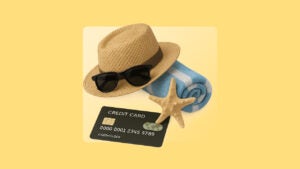Spending on experiences is hotter than the July sun

The Federal Reserve is having a musical summer. First, Fed Chairman Jerome Powell was spotted at a Dead & Company show in Virginia, then the Fed’s Beige Book noted the economic impact of Taylor Swift’s Eras Tour.
“May was the strongest month for hotel revenue in Philadelphia since the onset of the pandemic, in large part due to an influx of guests for the Taylor Swift concerts in the city,” the document reads.
“Swifties” are spending an average of $1,328 to attend each concert, according to a QuestionPro survey. This includes event tickets, outfits, merchandise, refreshments and travel.
“These numbers are pretty incredible,” according to Dan Fleetwood, president of research and insights at QuestionPro. “If Taylor Swift were an economy, she’d be bigger than 50 countries.”

Pent-up demand continues to play out
The Eras Tour would probably sell out in just about any economy, but despite current worries about the state of Americans’ financial affairs, experiences of all types are hot right now. This is likely in large part because of the pent-up demand that stacked up during the COVID-19 pandemic. Americans are splurging on travel, dining, concerts, sporting events and other in-person events, but spending on physical items such as electronics, furniture and home improvements has been much more lackluster as of late.
To be fair, demand for tangible goods was pulled forward the past few years as people spent more time at home — and I certainly understand the desire to get back out there after the pandemic. But, I have to say, I’m surprised at the strength and breadth of this spending, especially with high inflation, high interest rates and recession worries looming.
Last summer was supposedly all about “revenge travel,” yet the Transportation Security Administration processed 11 percent more air travelers from May 26 through July 17 this year versus last. Bar and restaurant sales posted the second-largest year-over-year increase of any category in the Census Bureau’s June 2023 retail sales report (up 8.4 percent). Twenty-four of the 30 Major League Baseball teams are on pace to attract more fans in 2023 than they did in 2022. And spending on live entertainment, excluding sports, increased 47 percent from the first quarter of 2022 to the first quarter of this year. Collectively, we’re YOLO-ing even harder in 2023 than we did a year ago.
How to pay for it all
Alas, while all of this spending feels good, there is a potential downside — particularly if you’re financing it with a credit card. The average credit card rate is a near-record 20.44 percent. There’s a huge difference between someone who is using credit cards for rewards and convenience and paying in full to avoid interest, versus someone who is paying a hefty interest rate month after month. More than a third of all U.S. adults (which works out to almost half of credit cardholders) carry balances from month to month.
I don’t want to say that you can’t have any fun, but try to avoid credit card debt if at all possible. It’s easy to get into it and hard to get out of it. Six out of every 10 people with credit card debt have been in debt for at least a year. Especially as there are more temptations to spend — trips, concerts, dinners out, weddings and so forth — it’s so important to have a good handle on your budget. Your monthly outflows have probably changed due to high inflation, and they might change again soon as federal student loan payments are set to resume this fall.
Setting money aside from every paycheck is a smart idea. Consider automatically diverting some funds into a dedicated emergency savings account and others into a fun money account. You might also consider signing up for a new credit card with a generous sign-up bonus or a lengthy 0 percent intro APR offer. Earning as many rewards as you can on purchases you would have made anyway is a smart way to stretch your dollars. But the value of those rewards evaporates very quickly if you carry a balance.
The bottom line
It feels like we’ve been hearing for two years now that a recession is right around the corner. While it hasn’t arrived yet, the leading economists that we polled still think a recession is likely to occur over the next 12 months.
All news is local, too. And I’m talking about your household, not your neighborhood. For example, whether or not you have credit card debt is a big fork in the road. Your income is obviously very important as well, since it plays a key role in how inflation is affecting you and your family. Your job security is another key factor.
Do a spending audit and track where your money is going. You’re certainly entitled to spend money on trips, concerts, nights out with friends and other things that you enjoy, but make sure that you’ve accounted for these spending categories ahead of time. That’s the best way to ensure that you truly enjoy the experience and aren’t saddled with a debt hangover when the bill arrives.
Have a question about credit cards? E-mail me at ted.rossman@bankrate.com and I’d be happy to help.
Why we ask for feedback Your feedback helps us improve our content and services. It takes less than a minute to complete.
Your responses are anonymous and will only be used for improving our website.






